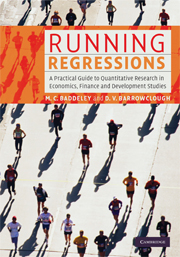 Running Regressions
Running Regressions Book contents
- Frontmatter
- Contents
- List of figures
- List of tables
- List of boxes
- Acknowledgements
- List of acronyms
- How to use this book
- Part I Simple regression and data analysis
- Part II Multiple regression and diagnostic testing
- 5 Multiple regression analysis
- 6 Heteroscedasticity
- 7 Autocorrelation
- 8 Model misspecification
- Part III Time-series econometrics
- Part IV Advanced topics
- Index
- References
6 - Heteroscedasticity
R&D, invention and innovation
Published online by Cambridge University Press: 05 June 2014
- Frontmatter
- Contents
- List of figures
- List of tables
- List of boxes
- Acknowledgements
- List of acronyms
- How to use this book
- Part I Simple regression and data analysis
- Part II Multiple regression and diagnostic testing
- 5 Multiple regression analysis
- 6 Heteroscedasticity
- 7 Autocorrelation
- 8 Model misspecification
- Part III Time-series econometrics
- Part IV Advanced topics
- Index
- References
Summary
Economic issues include:
Invention versus innovation
Role of technology
Econometric issues include:
Homoscedasticity and heteroscedasticity
Heteroscedasticity tests: the Goldfield–Quandt test, White's test
Weighted Least Squares (WLS)
Data issues include:
Measuring innovation and knowledge: an innovativeness index
Working with outliers
The issue
Innovation is essential for economic growth and development, whether for countries that are technological leaders at the frontier of knowledge or for countries that are ‘latecomers’, catching up on technical advances made elsewhere. Globalisation has interacted with rapid technological change and trade has become increasingly open and competitive, transport costs have fallen, and capital and labour have become more and more mobile. International competitive pressures have become more pronounced and all countries, rich and poor, have had to innovate constantly.
Innovation can also involve finding new ways to do the same old things – for example in introducing new processes that can reduce the price and/or raise the quality of traditional products – such as wine. Overall, being innovative is important everywhere; it has important implications for developing countries as well as developed ones (UNCTAD, 2007); it is as important to individual firms as it is to nations as a whole. It is also important to individual people – we need to keep investing in and refreshing our personal human capital; in modern economies for example, there are many good reasons (social as well as professional) to be computer literate, i.e. to ‘invest’ in our human computing capital.
Information
- Type
- Chapter
- Information
- Running RegressionsA Practical Guide to Quantitative Research in Economics, Finance and Development Studies, pp. 133 - 156Publisher: Cambridge University PressPrint publication year: 2009